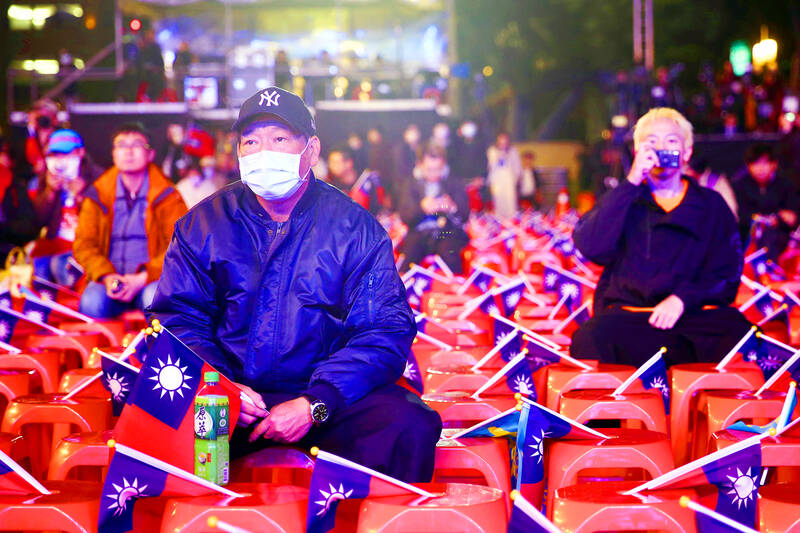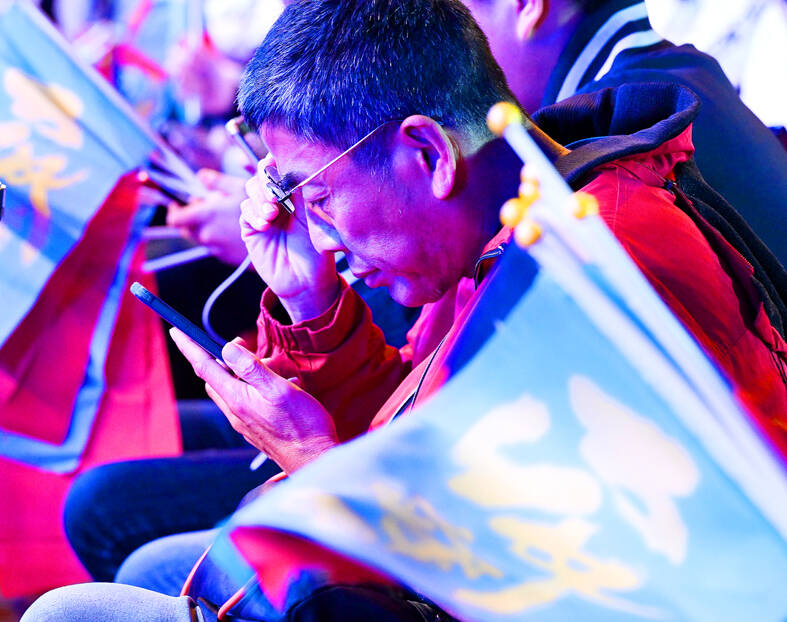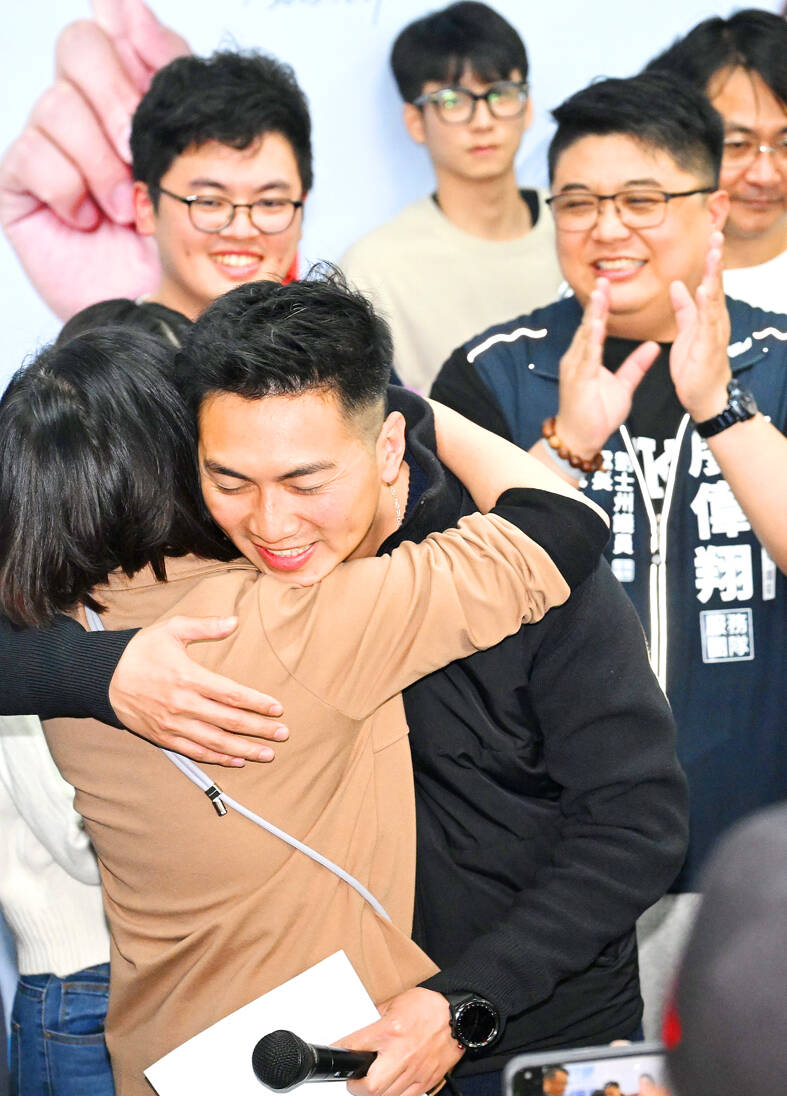Chinese Nationalist Party (KMT) presidential candidate Hou You-yi (侯友宜) last night conceded defeat in the presidential election after losing to the Democratic Progressive Party’s (DPP) William Lai (賴清德) by a margin of about 7 percent.
“I let everyone down for failing to deliver the change of government as expected, and I am deeply sorry,” Hou told supporters participating in the election-night rally.
“I respect the final choice of the voters. This is a democratic election, which means that the voters decide the election’s outcome. We need to face the voters and listen to them. We should move forward based on voters’ expectations,” Hou told rally participants.

Photo: Ritchie B. Tongo, EPA-EFE
“I would like to congratulate Vice President Lai and his running mate, Hsiao Bi-khim (蕭美琴), with winning the election. I also hope that they would not disappoint Taiwanese... They should have Taiwanese in mind and listen to them. We had a competitive race, but the most important thing is that all political parties should unite Taiwanese after the election in face of all possible challenges in the future. The last thing we need is a divided Taiwan,” he said.
Hou encouraged supporters to turn anger and frustration into power to oversee the DPP government, saying this is the way to move Taiwan forward and defend the nation.
“We will not disappear. Instead, we should become stronger, grow further and move forward. This is the attitude of Taiwanese,” Hou said. “I will roll up my sleeves and work tomorrow, so I would not disappoint people’s support for me.”

Photo: Liao Chen-huei, Taipei Times
A New Taipei City resident surnamed Hsu (許), who voted for Hou and his vice presidential candidate, Broadcasting Corp of China (BCC) chairman Jaw Shaw-kong (趙少康), told the Taipei Times she was disappointed about the result, but that she was even more disappointed in Taiwan’s young people, as many of them voted for Taiwan People’s Party (TPP) Chairman and presidential candidate Ko Wen-je (柯文哲) following the breakdown of plans to form a “blue-white” KMT-TPP alliance last year.
“After what happened in the Nov. 23 meeting between KMT and TPP leaders, people can see that Ko is dishonest and cannot be trusted. He can change his political opinions just like that, and yet he could still garner a sizeable share of the popular vote this time. I am just speechless,” Hsu said.
Although the TPP and KMT at first agreed to cooperate in the legislature, the two parties eventually parted ways after failing to agree whether Hou or Ko should be the presidential candidate.

Photo: Liao Yao-tung, Taipei Times
Hsu said that Hou was outperformed by Lai, even in New Taipei City, where Hou has served as mayor for five years and as deputy mayor for eight years.
“It was like what happened to former Kaohsiung mayor Han Kuo-yu (韓國瑜), who ran for president soon after he was elected mayor. Hou did pretty well as New Taipei City mayor and was even re-elected in 2022, but people probably thought he was no different from other politicians, who went ahead to pursue a higher office after they were re-elected in local elections,” Hsu said.
However, Hsu said, the KMT performed well in the legislative elections and even flipped a few seats previously held by DPP legislators, adding that she hoped the party would be a check and balance on the power of the DPP government.
The turnout rate for the presidential race was 71.86 percent, Central Election Commission data showed.
The KMT lost in the three-way presidential race in 2020, capturing 38.61 percent of the votes. Prior to that, the party lost in the three-way presidential race in 2000, garnering only 23.1 percent of the votes.

Chinese spouse and influencer Guan Guan’s (關關) residency permit has been revoked for repeatedly posting pro-China videos that threaten national security, the National Immigration Agency confirmed today. Guan Guan has said many controversial statements in her videos posted to Douyin (抖音), including “the red flag will soon be painted all over Taiwan” and “Taiwan is an inseparable part of China,” and expressing hope for expedited reunification. The agency last year received multiple reports alleging that Guan Guan had advocated for armed reunification. After verifying the reports, the agency last month issued a notice requiring her to appear and explain her actions. Guan

GIVE AND TAKE: Blood demand continues to rise each year, while fewer young donors are available due to the nation’s falling birthrate, a doctor said Blood donors can redeem points earned from donations to obtain limited edition Formosan black bear travel mugs, the Kaohsiung Blood Center said yesterday, as it announced a goal of stocking 20,000 units of blood prior to the Lunar New Year. The last month of the lunar year is National Blood Donation Month, when local centers seek to stockpile blood for use during the Lunar New Year holiday. The blood demand in southern Taiwan — including Tainan and Kaohsiung, as well as Chiayi, Pingtung, Penghu and Taitung counties — is about 2,000 units per day, the center said. The donation campaign aims to boost

The Kaohsiung Tourism Bureau audited six hotels in an effort to prevent price gouging ahead of Korean band BTS’ concert tour in the city scheduled for Nov. 19, 21 and 22 this year. The bureau on Friday said that the audits — conducted in response to allegations of unfair pricing posted on social media — found no wrongdoing. These establishments included the local branches of Chateau de Chine, Hotel Nikko, My Humble House, and Grand Hai Lai, it said, adding that the Consumer Protection Commission would have penalized price gougers had the accusations been substantiated. The bureau said the Tourism Development Act

The Central Weather Administration (CWA) said a magnitude 4.9 earthquake that struck off the coast of eastern Taiwan yesterday was an independent event and part of a stress-adjustment process. The earthquake occurred at 4:47pm, with its epicenter at sea about 45.4km south of Yilan County Hall at a depth of 5.9km, the CWA said. The quake's intensity, which gauges the actual effects of a temblor, was highest in several townships in Yilan and neighboring Hualien County, where it measured 4 on Taiwan's seven-tier intensity scale, the CWA said. Lin Po-yu (林柏佑), a division chief at the CWA's Seismological Center, told a news conference